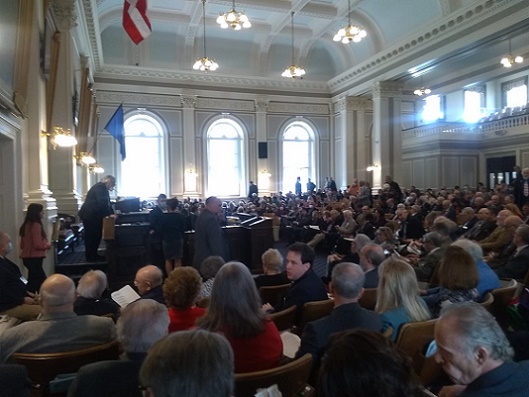I was prime sponsor for twelve bills this year. HB72, building code amendments, was killed because it duplicated SB 15, which passed. HB 628, legalizing possession and home grow of cannabis, was killed in the Senate (after passing the House 241-113!)
HB 1016, licensing speech-language specialists in schools; HB 1062, electrology licensing clarification; HB 1192, on acupuncture licensing; HB 1288, on names and titles in the department of administrative services; and HB 1398, studying centralized criminal records checks in schools, have all been signed by the governor. HB 1681, updating the state building code, is on its way to his desk.
HB 1061, on the midwifery council, and HB 1191, including duplexes as well as single family homes from the licensing requirement for plumbing, electric and gas fitting, are both in interim study in my committee. I expect them both to be resubmitted next year, in a modified form. Likewise, HB 1447, prohibiting facial recognition technology by state agencies, is in interim study in the Transportation Committee.
HB 1563, auto-enrolling new state employees in the deferred compensation plan, was killed after the public hearing convinced me that it should not be a legislative mandate, but rather something agreed on by the employees and their management.
We want to thank NH State Rep Carol McGuire for this Op-Ed. If you have an Op-Ed or LTE
you would like us to consider, please submit it to Editor@GraniteGrok.com.
That’s 50% passing, plus three more actually being studied and one included in another bill – not my best year, but reasonable.
I also cosponsored 28 more bills – way too many! I didn’t actually work on very many of them, but when a friend asks you to cosponsor a bill that is a good idea, it’s hard to say no.
HB 20, education freedom accounts, is on the table in the House because its content was included in last year’s budget. HB 349, deleting the requirement for school nurses to be certified by the department of education (but not that they be registered nurses) passed the House and was killed in the Senate, as was HB 1401. This prohibited the federal government (but not the state!) from tracking individual vehicle mileage – likely as part of a mileage tax for vehicles that don’t pay much gas tax.
HB 457, which allows the legislative youth advisory council to meet remotely, has been signed by the governor. My committee radically simplified this bill, eliminating the changed scope and a new appointing authority; we weren’t convinced this council is useful, but decided to give them another year to prove themselves. HB 568, tapering out the interest and dividends tax, was killed as duplicative: a similar plan was included in the budget.
HB 1018, converting the board of medical imaging and radiation therapy into an advisory board, was another request of OPLC. This bill has been signed by the governor, as has the similar HB 1446, on the boards of recreational therapists and respiratory care practitioners. HB 1043, a study committee on regulations that apply to small food businesses, was killed in the House because they thought the state wide food truck license created by HB 1595 resolved the issue. I’m not sure, but at least it gives some relief from the inconsistent local regulations.
HB 1298, an increase in the income limit for the education tax credit scholarships, passed the House but died in the Senate. HB 1312, on water pollution and waste disposal rulemaking, is in interim study in my committee, looking at the interaction of the building codes (specifically the plumbing code) and the septic and sewer requirements, which are largely in rules. HB 1348, legalization of cannabis (and allowing home grow) was tabled in the House, in preference to the simpler HB 629. HB 1598, legalizing cannabis and setting up a regulatory structure for sales, passed the House and was killed in the Senate. I’m a member of the cannabis caucus, since prohibition doesn’t work and I believe cannabis should be legal – enough people seem to want it!
HB 1507, timely publishing childcare investigations, has passed both houses and is going to the governor. HB 1520, requiring guardians ad litem to provide itemized bills when asked, passed the House and went to interim study in the Senate – not sure why, it seems simple enough.
SB 221, a minor reorganization of the department of corrections, has been signed by the governor. SB232, clarifying that a school district’s retained surplus can only be used for emergency expenditures, or to offset taxes, was killed in the Senate. SB 264, transferring the low income energy assistance program to the new Department of Energy, went to interim study in the House to resolve some issues between the department and the Public Utilities Commission, which currently oversees this program.
SB 274, prohibiting project labor agreements in state government construction contracts, passed the Senate but was killed in the House. My committee heard all the union opposition to this bill, even though such an agreement has never been used in New Hampshire!
SB 282, revising some of the language in the acupuncture licensing statute, has passed both the House and the Senate and is on its way to the governor. SB 290, exempting ear acupuncture from licensing, passed the Senate and is in interim study in the House. SB 292, requiring a probation or parole officer be notified of an arrest, is also in interim study, but the study is mostly to make sure the automatic notification process the state police claim is within their capability actually gets implemented!
SB 310, allowing private organizations to use license plate scanners, was killed by the House as an invasion of privacy. SB 313, cleaning up statutory language setting license fees, and SB 330, on the authority of the OPLC to set fees, have both passed House and Senate and are headed for the governor. The same is true for SB 337, authorizing data sharing for EMT services, SB 398, creating an advisory committee on building code updates, SB241, clarifying the dual enrollment program between high schools and community colleges, and SB 443, requiring municipal amendments to the building and fire codes be reviewed and published by the building code review board or the state fire marshal.
A fairly productive year: twelve passed, five in interim study (at least three of which will actually be studied!) three combined with other bills, and eight killed. The ones I actually worked on were the building code process and most of the licensing changes, all of which went through my committee (it’s much easier that way.)
I also signed up for another term, this time in the new, larger floterial: Allenstown, Dunbarton, Epsom, and Hooksett. It’s a two seat district, and former representative JR Hoell, from Dunbarton, has also signed up for that district.
My husband Dan McGuire, is also running again, from the single seat Epsom district. He has a contested primary, against incumbent representative John Klose. Since I don’t, I won’t do much campaigning until August – Epsom and Dunbarton Old Home Days are both on August 13, and Allenstown’s (with Pembroke) is August 27. Hooksett doesn’t have an Old Home Day…
See you there!
 Representative Carol McGuire
Representative Carol McGuire
carol@mcguire4house.com
